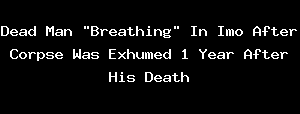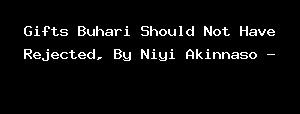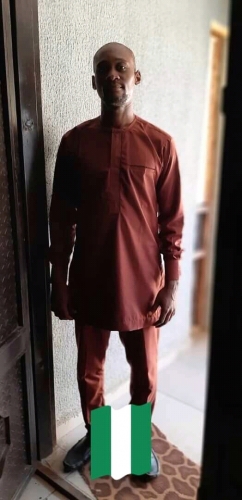Nsidibe26
Others : I Am An Honest Person .I Am An Hard Working Person
Wants to meet Business Partners
Articles
871
Followers
13
profile/2634FB_IMG_15918017001420688.jpg
Nsidibe26

Dead Man "Breathing" In Imo After Corpse Was Exhumed 1 Year After His Death
~1.1 mins read
Villagers in Umuoji, Amucha, in Imo state, were left in shock
when the corpse of a dead man was exhumed and they
discovered he was still "breathing" and his body was yet to
decay.
In a video shared online, a crowd is seen gathered around a
casket with the body of a dead man inside it.
"He's breathing, he's breathing," those in the crowd say in
shock.
The man reportedly died on November 20, 2019, and was
buried on 8 October, someone in the video is heard saying.
Another voice is heard saying the man has been dead for
one whole year and has been buried for over three weeks
yet he's still breathing. Another voice in the video
interjected, saying the man has been buried for almost a
year.
"Since I was born, I've never heard a thing like this but now
I've seen it with my two eyes. Abomination," the man filming
is heard saying.
The man filming explained that the man's corpse was
exhumed because the land he was buried in is someone
else's.
He continued: "He was buried in a land that is not his own,
so his spirit cannot rest. Because the land he was buried in
is not his."
The video shows the casket housing the corpse is already
being eaten by insects. However, the man's body is still
intact and has shown no sign of decay. Those gathered
round the casket commented on this too.
The daughter of the deceased man was later invited and the
casket was opened for her to identify her father.
Watch the video below.
https://www.youtube.com/watch?v=Jd3iAC8x5BE
https://www.instagram.com/p/CHDu4_wDP6V
profile/2634FB_IMG_15918017001420688.jpg
Nsidibe26

Gifts Buhari Should Not Have Rejected, By Niyi Akinnaso -
~4.2 mins read
Niyi Akinnaso
ORDINARILY, the celebration of a nation’s independence
anniversary is an occasion for reckoning and self-
assessment. The nation’s gains and failures are evaluated
by the government and the governed. In the process, gifts
are exchanged between the government and the people.
Such gifts are often symbolic, rather than material.
The government’s symbolic gifts are often packaged in a
speech by the nation’s leader, as witnessed on the
occasion of Nigeria’s independence anniversary on
October 1, 2020. Perhaps unkowingly, the President
invited symbolic gifts of counsel from the citizens in
Paragraph 9 of his speech: “Sixty years of nationhood
provides an opportunity to ask ourselves questions on the
extent to which we have sustained the aspirations of our
founding fathers. Where did we do the right things? Are we
on course? If not, where did we stray and how can we
remedy and retrace our steps?†The gifts of counsel
discussed below are various attempts to identify where
things went wrong and how they could be remedied.
As usual, one-time military Head of State and two-term
President, General Olusegun Obasanjo, initiated the series
of citizens’ symbolic gifts on September 11, 2020. The
shattered debris of the World Trade Centre, plane-bombed
by a terrorist attack on the United States on September
11, 2001, lurked in the background as a coincidental
backdrop for Obasanjo’s warning against the
disintegration of Nigeria in the face of what he aptly
described as “mismanagement of diversity and socio-
economic development of our countryâ€.
The “mismanagement†has engendered various indices of
possible failure-terrorism, banditry, sectarianism,
nepotism, kidnapping, religious and ethnic bigotry, a
depressed economy, rising inflation, separatist agitations,
and so on. The thrust of Obasanjo’s statement was a call
to mend broken and breaking fences in order to avert state
failure, realising that “… even if Nigeria is broken up, the
separated parts will still be neighbors … they will have to
find accommodation as neighbors or they will be ever at
war.â€
Nobel Laureate, Professor Wole Soyinka, followed with an
endorsement of Obasanjo’s advice and chastised
government functionaries for the insolent response in
which Obasanjo was described, among other things, as
“Divider-in-Chiefâ€.
A few days later, Lt. General Alani Akinrinade, former
Chief of Army Staff and later Chief of Defence Staff,
offered his own gift of counsel to Buhari through Lt
General Tukur Yusuf Buratai, the present Chief of Army
Staff, on the occasion of the latter’s visit to commission
projects in Osun, Akinrinade’s home state.
After highlighting popular public perception of President
Buhari in mainstream and social media as an ethnic bigot,
a religious fundamentalist, a purveyor of lopsided
appointments, and a failed fighter against terrorism,
Akinrinade called on him to take charge: “He needs to
stand on his table against the motley crowd of advisers
and take a firm stand on their organisation of our country,
physically, politically, economically and socially.†The
veiled reference to Buhari’s aloofness, torpidity, and
tardiness cannot be missed in Akinriande’s speech. The
key solution he suggested is the restructuring of the
country, which he likened to “reorganisation†in the Army.
More recently, three respected clergymen came up
independently with their own offerings, all reinforcing a
similar message to President Buhari: Act quickly to avoid
disaster in the face of various problems facing the country
today.
Admitting that “Nigeria is sick unto deathâ€, Catholic
Bishop Emeritus of Lagos, Cardinal-Priest, Anthony
Olubunmi Okogie, highlighted four significant sources of
downfall to avoid, namely, (1) selfishness; (2) falsehood;
(3) the 1999 Constitution; and (4) “those who would
manipulate our ethnic, religious and regional differences to
attain and remain in powerâ€. Echoes of Obasanjo’s and
Akinrinade’s gifts are unmistakable.
The Bishop of the Roman Catholic Diocese of Sokoto,
Matthew Hassan Kukah, sees Nigeria literally as “a pool of
bloodâ€, starting with the cold-blooded murder of our first
Prime Minister, Abubakar Tafawa Balewa, in the name of
a military coup in 1966. Today, “After 60 years of
bloodletting, blood has become embedded in our culture
of existenceâ€, Kukah added. He concluded that “our
country now looks like a boiling pot in which everyone is
trying to escape†owing to disrespect for the nation’s
Constitution, sectionalism, and failure to fulfill campaign
promises.
The General Overseer of the Redeemed Christian Church of
God, Pastor Enoch Adeboye, completes the trilogy of gifts
by Men of God. Without mincing words, he advised the
Federal Government to pay immediate attention to
restructuring the country in order to provide a lasting
solution to Nigeria’s economic challenges and separatist
agitations. Adeboye recommended adaptation of aspects
of presidential and parliamentary systems as well as the
inclusion of traditional rulers in governance, by
constituting a House of Chiefs.
The language of the above presentations may appear
strident, conveying a sense of urgency. Nevertheless, the
call for restructuring the country is an old song. Two
national conferences have even been held, each
suggesting various forms of modification of the current
structure.
Central to these suggestions is the need to restructure the
country in order to make it more governable and more
responsive to the people’s yearnings and aspirations. This
was also the key message of the Nigeria Governors Forum,
as echoed by its Chairman, Dr. Kayode Fayemi, following
the meeting of all 36 state governors last week. The
Governors called for two types of restructuring. One, they
want their present loans restructured. Two, they want the
country restructured. Specifically, they called for the
devolution of powers and fiscal federalism.
The average age of the six interventionists discussed
earlier is 80! The Buhari administration may not always
agree with their views. However, dismissing them with a
wave of the hand and calling any of them names is the
height of insolence, as acknowledged by Professor
Soyinka: “In place of reasoned response and openness to
some serious dialogue, what this nation has been obliged
to endure has been insolent distractions from garrulous
and coarsened functionaries, apologists and sectarian
opportunists.â€
By rejecting the gifts of counsel and remaining impervious
to the calls for restructuring, Buhari is perpetuating
widespread public perception of a sectarian leader, who
panders largely to a particular ethnic group. The persistent
resistance of leaders of that ethnic group to restructuring
is all too familiar.
Yet, restructuring would have been Buhari’s major legacy
had he listened. But whether he does or not, this country
will be restructured sooner or later.
Advertisement

Link socials
Matches
Loading...
